Foundation by Isaac Asimov
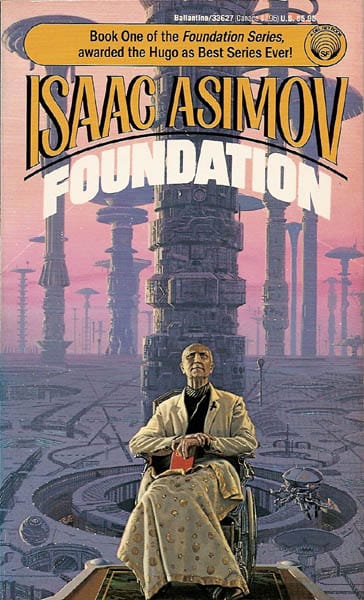
Foundation is a book that I haven't read until now. Given what I do at With Both Hands, it is good that I have read it, as I can now see that many other books I've read were responses to Foundation in the Great Conversation. If you want to play the game, you have to pay the price of entry.
This is not a book review, this is book criticism. The question to be answered is: did Asimov do a difficult job well, or contribute to the Great Conversation in a lasting way? We can dispense with the second entirely, as Foundation is sufficiently famous to provide the answer without further elaboration.
So it is to the first part that I turn myself. We will need to understand what it was that Asimov was trying to do in order to answer the question; and thus we will go into the book in detail. Since Foundation was published in 1951, and is nearly as old as my parents, I will follow WBH editorial policy and spoil the whole book.
First, I'll look at the craft of Foundation. Sometimes, when people say a book is "good", what they mean by that is the author has crafted it in a skillful and compelling way. This is inextricably linked with style preferences, and you just have to know what you like and what you don't, as style preferences widely vary.
Asimov starts off strong with a description through the viewports of the ship that is bringing the first POV character to the Imperial capital Trantor:
What Gaal was waiting for after the disappointment of the Jump was that first sight of Trantor. He haunted the View-room. The steel shutter lids were rolled back at announced times and he was always there, watching the hard brilliance of the stars, enjoying the incredible hazy swarm of a star cluster, like a giant conglomeration of fireflies caught in mid-motion and stilled forever.
Or consider this description of the planet itself:
He could not see the ground. It was lost in the ever increasing complexities of man-man structures. He could see no horizon other than that of metal against sky; stretching out to almost uniform grayness, and he knew it was so over all the land-surface of the planet. There was scarcely any motion to be seen – a few pleasure-craft lazed against the sky – but all the busy traffic of billions of men were going on, he knew, beneath the metal skin of the world:
There was no green to be seen; no green, no soil, no life other than man. Somewhere on the world, he realized vaguely, was the Emperor's palace, set amid one hundred square miles of natural soil, green with trees, rainbowed with flowers. It was a small island amid an ocean of steel, but it wasn't visible from where he stood.

This was striking when I first read it. It was also disquieting, as Asimov chose to represent the capital of the Empire that Hari Seldon wanted to save as something like an anthill. It is the first glimpse of a theme that will define the book, but theme is not style, so we'll come back to it. When George Lucas wanted to portray a capital city at the center of everything, he made it look exciting and full of life. Asimov chose something that is close to dead, with what life there is furtive and scurrying.
Later, Gaal meets a secret policeman who is trailing him who comments that children born on this world must come up and see the vista once a year, but thee youngest ones scream and scream because they prefer the closed spaces below.
The other thing that is striking about these genuinely superb descriptions is that after this, almost no description is used for the rest of the book. This is a very talky book; lots of dialogue, very little description of either people or places or things or actions. Which is interesting, because that clearly is something Asimov could do. So it is a choice to do it this way. By Asimov's choices, we can attempt to guess at what was seen as important.
There is hardly any action described in text. There is lots of action implied, but it is all interstitial. This is a clever technique. One advantage to this technique is that it allows vast sequences of time to be incorporated more naturally in the flow of the text, as the mind of the reader fills in what must have happened. It also allows for the reader to fill the gap with whatever makes the most sense to them, one of the great strengths of books over visual media.
One of the common disappointments of movie adaptions of popular books is that a movie director must pick one embodiment out of all the possible ones to film; whereas each reader's imagination can supply a unique version of what the book describes. However, since this power is wholly internal, it also means that the reader must bring some amount of prior knowledge to supplement the text, which is much lower bandwidth than our visual senses.
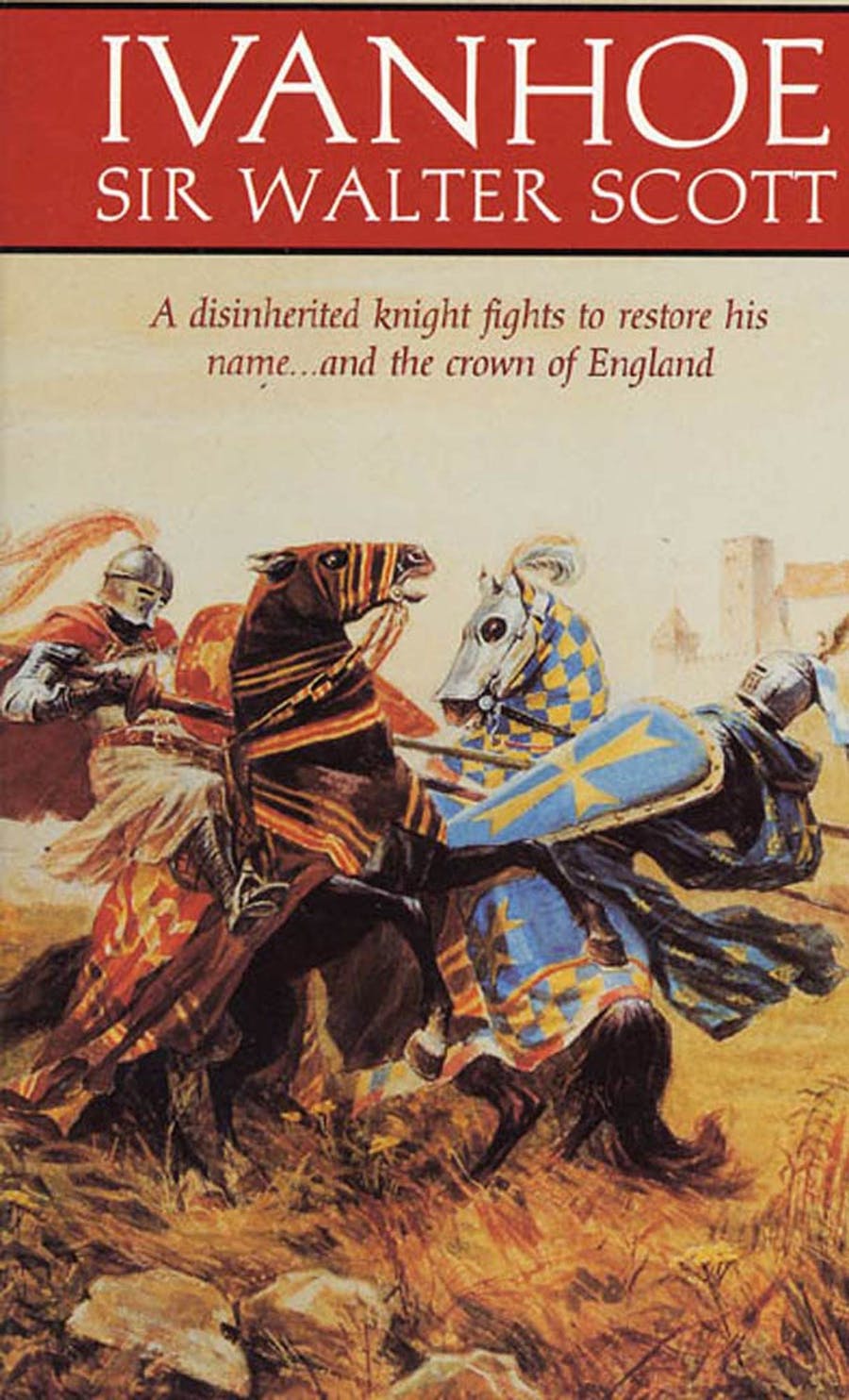
Ivanhoe tends to strike contemporary readers as hopelessly wordy, as Sir Walter Scott provided his readers with extensive naturalistic descriptions of places and things most of them had never seen. In an era of CGI and image searches, none of us need that. Asimov's large gaps must be filled by the reader's imagination, and it occurs to me that most of his original readers would have filled the gaps with things they probably read in the pulp adventures that preceded Foundation.
This is very funny to me, as Asimov's hatred of the adventure story authors who came before him is well-known. However, as the quip by the secret policeman above makes clear, Asimov was a very bright and a very self-aware author. Asimov described the Imperial capital as something like an anthill, and then doubled-down by having a character voice what the locals do in a panic when they see the outside. I think this too will prove to be important as we assess what it was that Asimov was trying to do, and thus determine how well it was accomplished.

Asimov repeatedly mocks his space opera predecessors by having one of his Foundation men vanquish a man of action by superior knowledge and trickery. It is hard to avoid the impression of this book being a poindexter power fantasy, given how often this occurs, and how prominent the events are in text. The first example of this sets the tone for the rest, when Hari Seldon himself is arrested and exiled by Linge Chen, head of the Commission of Public Safety. This act is predicted and engineered by Seldon:
The Chief Commissioner's gavel rose and fell. Hari Seldon left the stand and quietly took his seat next to Gaal.
He smiled and said, "How did you like the show?"
Gaal said, "You stole it. But what will happen now?"
"They'll adjourn the trial and try to come to a private agreement with me."
...
"Because, my boy, in a plan such as ours, the actions of others are bent to our needs. Have I not said to you already that Chen's temperamental makeup has been subjected to greater scrutiny than that of any other single man in history? The trial was not allowed to begin until the time and circumstances were right for the ending of our own choosing."
After this, the next to fall are the very men appointed by Seldon to lead the project in exile after Seldon's death, the Encyclopedists. At first, I was prepared to give Asimov more credit for mocking unworldly scientists, but then I realized that this was another pulp trope that he wanted to deflate. These scientists weren't his people, as the exchange between Lord Dorwin, Imperial emissary and amateur archaeologist, and Hardin shows:
"And that means it was humanity's birth planet?"
"P'haps. I must wead it closely and weigh the evidence befoah I can say foah cuh-tain. One must see just how weliable his obsuhvations ah."
Hardin remained silent for a short while. Then he said, "When did Lameth write his book?"
"Oh – I should say about eight hundwed yeahs ago. Of cohse, he has based it lahgely on the pwevious wuhk of Gleen."
"Then why rely on him? Why not go to Arcturus and study the remains for yourself?"
Lord Dorwin raised his eyebrows and took a pinch of snuff hurriedly. "Why, whatevah foah, my deah fellow?"
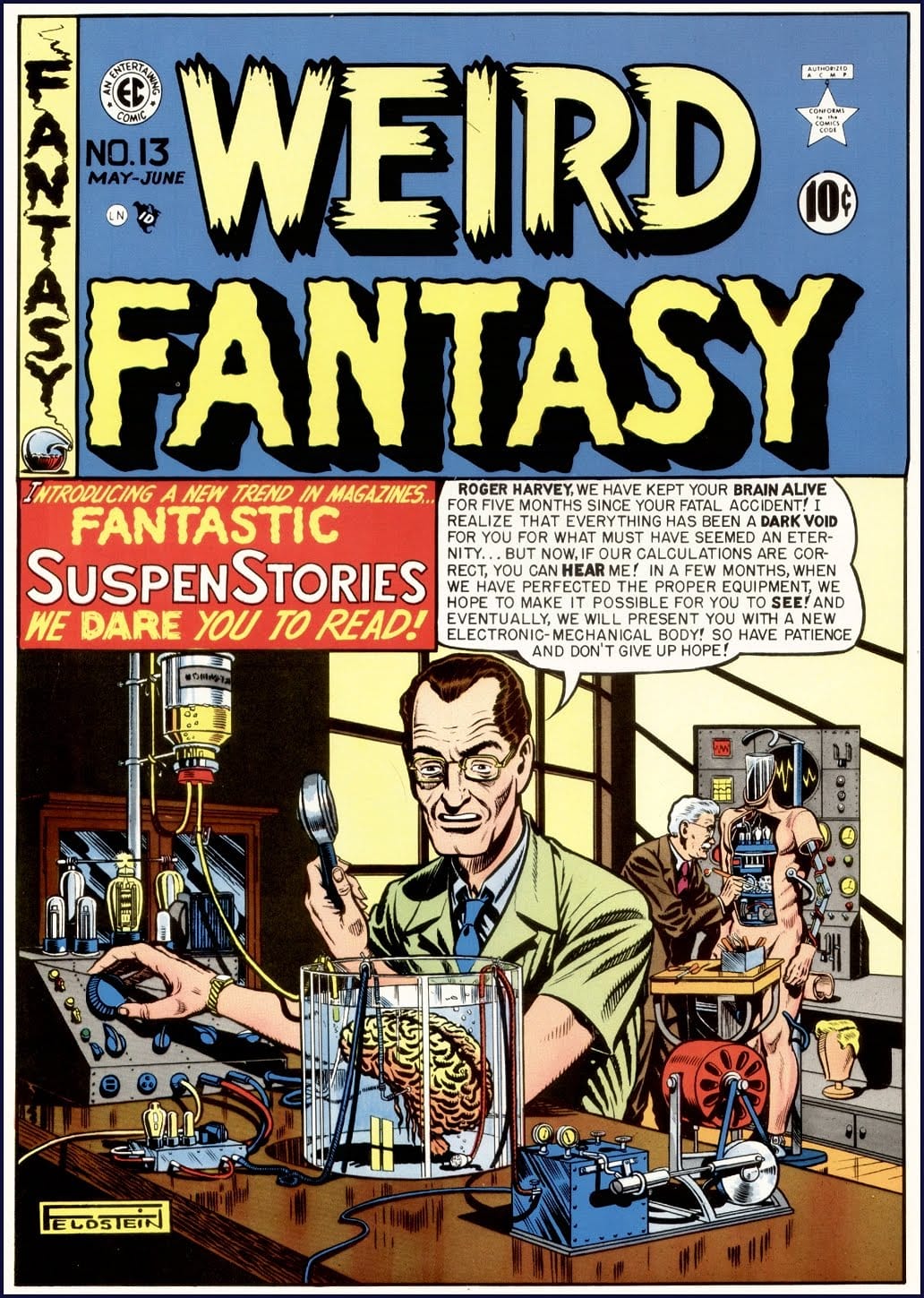
Asimov's self-awareness and pulp-hatred comes up again here, as the manner in which Salvor Hardin takes power from the Encyclopedists is described as a deus ex machina:
"We are to do nothing, is that right, except to wait in quiet serenity and utter faith for the deus ex machina to pop out of the Vault?"
"Stripped of your emotional phraseology, that's the idea."
What happens is that Hari Seldon himself comes to them via recording, a literal god in the machine, to ensure that his agents follow the course he has laid out. The whole book is a sequence of deus ex machina events. Each critical point is less an unfolding of a clever plan, or the evolution of unstoppable forces, and more an unexpected revelation that forces events into the desired path.
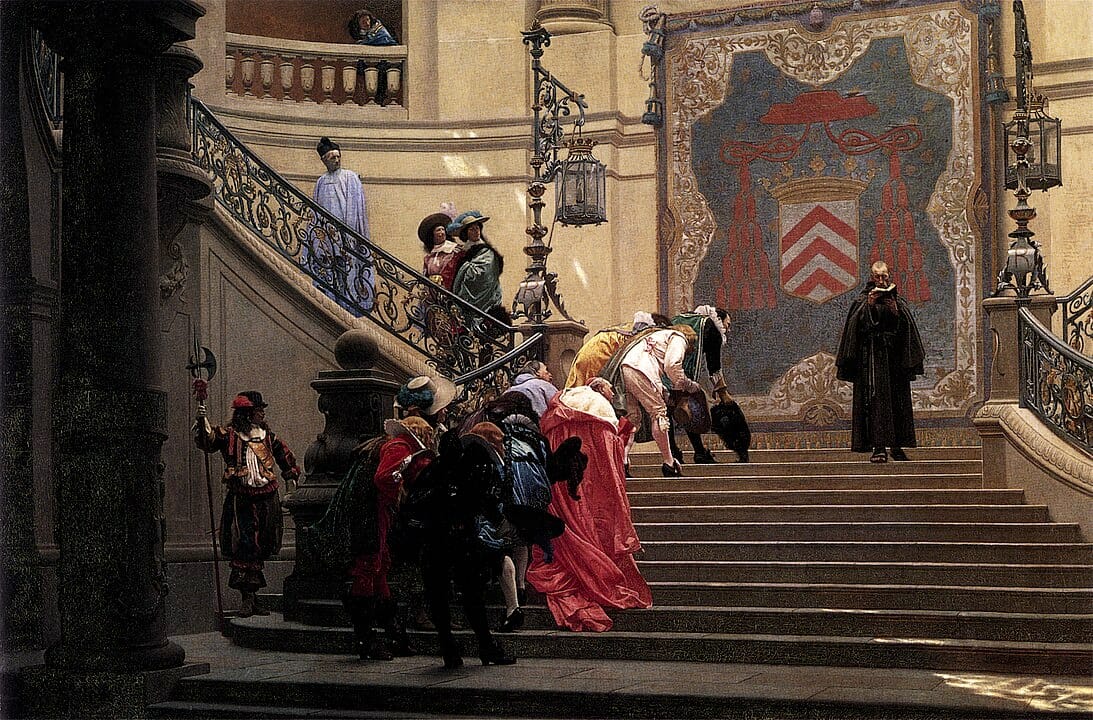
This basic structure is repeated in each major section, with Seldon's plan coming to fruition, and some stand-in for what Asimov disliked coming to a bad end. The scheming éminence grise Wienis who blows his head off in despair after being defeated by Hardin is particularly memorable. Each section, as a stand-alone story, would be pretty good. But once you start to see that each section is exactly the same as the last with a few details changed, I can now understand the varying reactions.
For people who like Asimov's style above all else, which flows nicely, I can imagine they see this writer's craft and the grand sweep of the story and are impressed. On the other hand, the same thing over and over again strikes me as lazy and boring, and that is another common reaction to Foundation, especially since the majority of the book is not just talking, but scheming, back-room dealing, backstabbing, and other kinds of subterfuge.
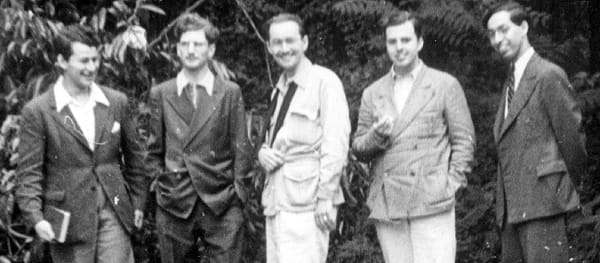
But that is really just the bare craft of the book. Asimov was one of the Futurians, and part of what united that group was a desire for science fiction to be seen as serious work, not just entertainment. Part of the value claimed for science fiction was that it was uniquely good at addressing the changes in society that rapid scientific and economic progress had created. Bulgarian writer Elka Konstantiova said this in 1973:
"Even though the origins of science fiction go back to the mid-19th century, nonetheless as a new literary genre, charged with special social functions, science fiction is the undoubted product of the nuclear age. The more meaningful the scientific and technological breakthroughs and their impact on modern life, the greater the role of science fiction, stimulating our vision for things to come, especially in the aspect of the changes wrought in man's mentality by the scientific and technological revolution. Science fiction brings home the awareness that the future will continue to bring radical changes in all areas of man's life; science fiction is there to prepare him for this eventuality." — Elka Konstantiova
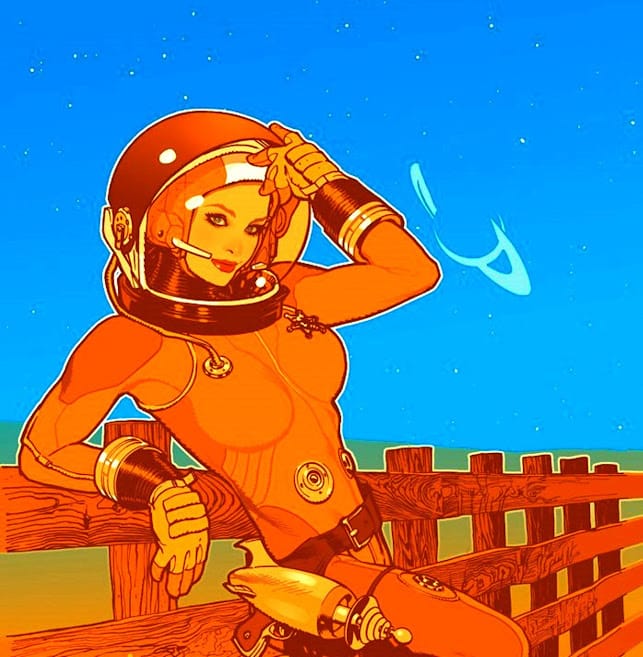
Asimov himself wrote an article in 1953, two years after the publication of Foundation, describing social science fiction and contrasting it to the other kinds of stories also called science fiction, which he separated into three categories, gadget, adventure, and social:
Gadget: The focus of the story is the invention itself: How it comes to be invented, how it works, and/or what it is used for. The invention is the end result of the plot.
Adventure: The invention is used as a dramatic prop. It may be the solution to a problem, or it may be causing the problem itself, but the main focus is on the caper and how the invention's presence helps or hinders it.
Social: The focus of the story is on how the presence of the invention affects people's daily lives, whether for good or for ill. The chief distinction between this and the other two types is that the presence of the invention influences the plot rather than causing it or being the goal.
Asimov was mostly interested in the last of these three kinds of stories, and I think it is pretty clear that his hope was that these kind of stories could not just describe social change, but prepare people for it, and maybe, just maybe, even spark it.
This is why I keep mentioning how self-aware Foundation is. Asimov invented the fictional discipline of psychohistory in an attempt to meme the thing into existence. So, I'm going to honor Asimov's memory by taking his idea seriously. Seriously enough that I'm going to keep shooting at it until it changes shape or catches fire.
So to start, we should look at how it is described in the book.
Gaal Dornick, using nonmathematical concepts, has defined psychohistory to be that branch of mathematics which deals with the reactions of human conglomerates to fixed social and economic stimuli.
...
Implicit in all these definitions is the assumption that the human conglomerate being dealt with is sufficient large for valid statistical treatment. The necessary size of such a conglomerate may be determined by Seldon's First Theorem which ... A further necessary assumption is that the human conglomerate be itself unaware of psychohistoric analysis in order that its reactions be truly random....
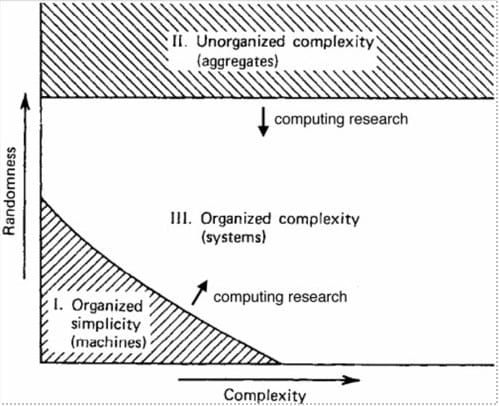
If I give Asimov a little grace, his definition of how psychohistory is supposed to work is clearly derived from Ronald Fisher's method of doing statistics and the systems engineering approach that was part of winning the Second World War. This model is nicely illustrated by the chart from Gerald Weinberg's An Introduction to General Systems Thinking, a 1975 text on systems engineering, the successor to operations research, which is one of the things Asimov did during World War II.
In the lower left is zone I, which is where we can understand our system analytically. We can just model the thing and solve the equations and out pops our answer. At the top is zone II, things that are too unorganized to solve analytically, and which we use statistics to understand. In the middle is zone III, organized complexity, which is too complex for analysis but has too small a sample size for Fisherian statistics methods.
However, I'm going to insist that everything started to go wrong right here, from the very beginning, even if this was the hot theory of the day. Everything about Asimov's psychohistory grates on me as terrible predictive modeling, misuse of statistics, and hopeless philosophy of science. Indulge me.
The very first problem is one of epistemology. Randomness is not a property of any actually existing system. Everything described as random is simply something that is difficult or even impossible to exhaustively document. Randomness is a property of our knowledge, not of the thing under study.
If we use Weinberg's chart with its axes of complexity and randomness, you can see that what Asimov means is that psychohistory works by pushing human behavior out of zone III [organized complexity] into zone II [unorganized complexity], as that is what Asimov [and Weinberg, to be fair], understood to be amenable to the use of statistics, as it is pretty clear there is no way to push human behavior to zone I.
The problem here is twofold. First, any decent predictive model will work just fine on smaller sample sizes, especially if you switch from Fisher's methods to logical probability or the Laplace-Jeffreys-Cox-Jaynes-Keynes approach, which is far more flexible than Fisher's methods.
The second is far worse in my opinion, as the whole edifice of the book is built upon the idea that psychohistory works perfectly well as long as the humans whose behavior is being predicted are sufficiently "random", which actually gets reduced to the even more restrictive condition, laid out in the quote, that the subjects of the discipline are unaware that psychohistory is being practiced upon them.
"Were you to discover the those ins and outs, our plan might fail; as it would have, had you penetrated the fraud of the Encyclopedia earlier; for then, by knowledge, your freedom of action would be expanded and the number of additional variables introduced would become greater than our psychology could handle"
There is a fig leaf of "parameters" put on this explanation, that the number of parameters in the model can no longer be solved if the people in question know too much, but of course this runs against the previous explanation that psychohistory only works on conglomerates of sufficient size. Asimov is always going on about how vast and inconceivable the Empire is, so having sufficient sample sizes isn't the real problem here.
John Nash's seminal paper on Nash equilibriums, the game-theoretic method of answering the question: what is the optimal solution when everyone knows the game is afoot? was published in 1951 as well, so perhaps Asimov cannot be blamed for not predicting this. But on the other hand, despite science fiction's pretensions about being the stories of the future, it is clear that most of the speculation in science fiction is really about how the author wishes the world to be right now.
The real issue is one of control, through de-humanization. What becomes clear as you progress through the book is that psychohistory can only work by keeping people as ignorant and as pliable as possible, which is the thing that moves human behavior from zone III [organized complexity] to zone II [unorganized complexity]. The true purpose of Seldon's plan is to limit human agency in order to allow his plan to proceed.
This is not speculation or interpretation by me. Asimov has one of his favored Foundation men, Hardin, state it baldly:
"Because even Seldon's advanced psychology was limited. It could not handle too many independent variables. He couldn't work with individuals over any length of time; any more than you could apply kinetic theory of gases to single molecules. He worked with mobs, populations of whole planets, and only blind mobs who do not possess foreknowledge of the results of their own actions."
Asimov was trained as a chemist, so perhaps the ideal gas law was the first thing that came to mind in this context. But then again, treating his fellow humans as featureless orbs randomly bumping into each other is a devastatingly accurate assessment of Asimov's failure to see the value in others, to respect their human dignity.
What we see in Foundation is the goal Hari Seldon set out to achieve requires extensive manipulation of humanity. Circumstances must be such that history moves in the correct direction, and above all else people must not be free to choose whatever they want, as free and informed choice destroys everything. The key character in each section is a master manipulator, who schemes and plots and lies, but never ever fights, because that would be gauche.
But then, it turns out that each of those men is in turn manipulated and controlled, so that even the master manipulators are manipulated in turn. And, spoiler alert, there is a Second Foundation, specializing in the study of psychology, which in subsequent volumes is shown to have been manipulating the First Foundation all along.

C. S. Lewis forcefully criticized exactly this in The Abolition of Man:
In order to fully understand Man's power over Nature, and therefore the power of some men over other men, really means, we must picture the race extended in time from the date of its emergence to that of its extinction. Each generation exercises power over its successors: and each, in so far as it modifies the environment bequeathed to it and rebels against tradition, resists and limits the power of its predecessors. This modifies the picture which is sometimes painted of a progressive emancipation from tradition and progressive control of natural processes resulting in a continual increase of human power. In reality, of course, if any one age really attains, by eugenics and scientific education, the power to make its descendants what it pleases, all men who live after are the patients of that power. They are weaker, not stronger: for though we may have put wonderful machines in their hands we have pre-ordained how they are to use them.
...
The real picture is that of one dominant age – let us suppose the hundredth century A.D. – which resists all previous ages most successfully and dominates all subsequent ages most irresistibly, and thus is the real master of the human species. But even within this master generation (itself an infinitesimal minority of the species) the power will be exercised by a minority smaller still. Man's conquest of Nature, if the dreams of some scientific planners are realized, means the rule of a few hundreds of men over billions upon billions of men.
The Abolition of Man was published in 1947, but Lewis accurately captured the future that Asimov envisioned in Foundation. If I didn't know Lewis was first, I would have thought he was critiquing Foundation.
Now I believe we can assess what it was that Asimov was trying to do, and how well he did it. What Asimov does not do is justify Seldon, either emotionally or intellectually, other than for Seldon to assert during his trial that he identifies with "the mystical generalization by which we refer by the term 'humanity'".
I believe this to be purposeful, in the same way the lack of description is purposeful. Asimov's lack of justification, just like his lack of description, allows the reader to fill in what he or she wishes. Asimov's work is parasitic on what has come before, but at the same time is intended to undermine what has come before, as you can see in repetitive manner in which Asimov caricatures outer space adventures.
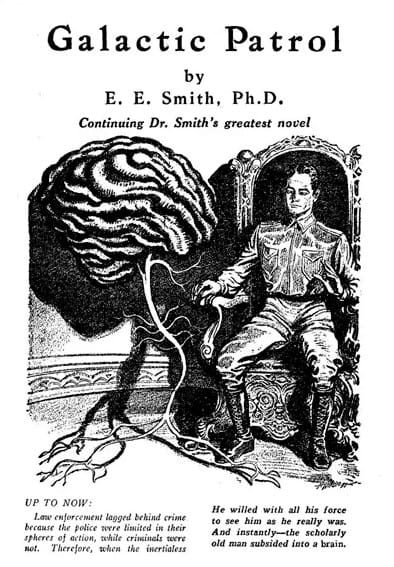
I believe this to be so because for Asimov to state his theme too baldly would be off-putting, to interfere with the grand project, so he allows it to be occulted with lacunae and crafty dialogue. I have asserted that Asimov was a very self-aware author, coming up to the edge of breaking the fourth wall with his theme. So now we come full circle, to the anthill-like description of Trantor at the very beginning.
If we take psychohistory seriously as presented, in order to fulfill its goals it must reduce the scope of human freedom, allowing only the chosen few purposeful action. Thus, I don't think the unattractive description of Trantor is an accident, anymore than I think the lack of wondrous descriptions is an accident, nor the strange flatness of the many people and places in the book.
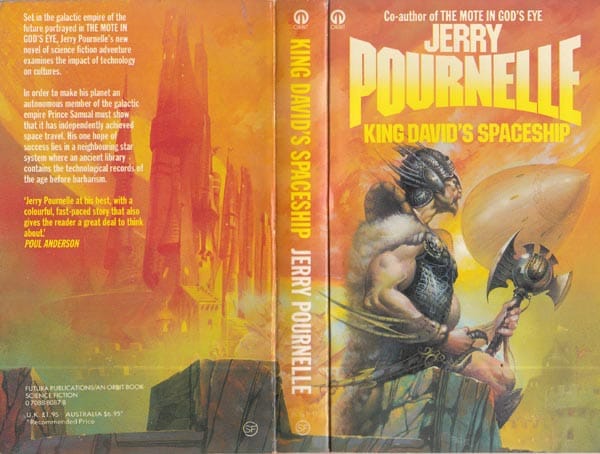
This is because the central theme of the book is that if the glorious future is to be achieved, then lesser men must be controlled by greater men, ideally without the lesser men even being aware of what is happening, as their cooperation is neither needed nor required. The ideal would be in fact something like an ant colony, where each individual has its place in a grand harmonious system.
However, this is not deeply attractive to many people, so selling it requires some skill. This also requires dishonesty, and I think you can see that dishonesty in how the central characters in each section will say things they don't mean, and that are not actually reflected in events.
Take Hardin:
I didn't say the Foundation, I said Terminus. I'm afraid you don't understand the situation. There's a good million of us here on Terminus, and not more than a hundred and fifty thousand are working directly on the Encyclopedia. To the rest of us, this is home. We were born here. We're living here. Compared with our farms and our homes and our factories, the Encyclopedia means little to us.
In this passage, Hardin sounds like a blood and soil patriot, but he isn't one. There is nothing at all in the book that shows Hardin loves his home, or his people. He's simply a man who will do whatever it takes to take and keep power. Or take this declaration by Hober Mallow:
This is a Seldon crisis we are facing Sutt, and Seldon crises are not solved by individuals but by historic forces. Hari Seldon, when he planned the course of future history, did not count on brilliant heroics but on the broad sweeps of economics and sociology.
Which is of course not what happens in the book, each Seldon crisis is dramatically solved by some clever, but unforeseen act by an individual. The reason for this is simple to understand: if you could actually rely on broad sweeps of economics to solve your problems, the book would truly be boring. Individual dramatic characters were needed to make it a story.
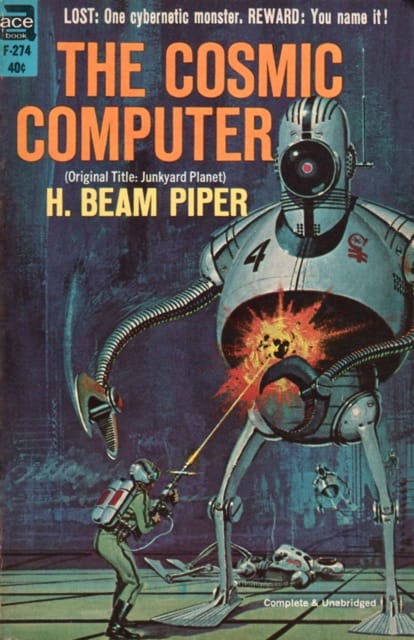
Now we can answer the question, was Asimov successful at memeing psychohistory into being? In the most literal sense, no, but in a more figurative sense, yes. Asimov really did convince a number of his readers that such a thing was not only possible but inevitable. However, that turned out to be very different from the thing actually happening.
If we ask whether Foundation is a compelling story, I think that it is better as propaganda than story. Take, for example, the dearth of description. Where Asimov chose to include description, it is quite good.
"We flushed one in the wilds of Samia that was a monster. And game as they come. We had it out for two hours over at least seventy square miles of ground. And I got to Sunwards – he was motioning graphically, as though he were once more in his speedster – "and dived torque-wise. Caught him on the rise under the left wing at quarters. It maddened him he canted athwart. I took his dare and veered a-left, waiting for the plummet. Sure enough, down he came. He was within a wing-beat before I moved and then – "
But I've included almost every instance of description in this essay. Description is so sparse that I have to conclude that Asimov thought following up on the adventure and wonder implied in that paragraph on Nyak hunting would get out of hand and become a distraction from doing what he really wanted to do.
The talk, the lack of description, the curiously flat characters and places, all of this in service of the idea Asimov wants to serve, instead of telling a great story. And in my judgement, that idea is a massively wicked one, which even Asimov seems to have known, insofar as he disguised it so cleverly. I think you can get a better sense of his intent from the kinds of things the Futurians said about fiction, rather than their fiction itself, which after all needed to be interesting to sell.
I can admire the skill with which Asimov wrote Foundation, while I despise the goal he sought, because it is deeply inhuman. Foundation is something like a secular materialist scripture, one intended to fill in every valley and make low every hill. That is how we should remember his, as a man who aligned himself with death over life, and bent his considerable talents to that goal.
With Both Hands Classics | My other book reviews | Reading Log
Mini-reviews
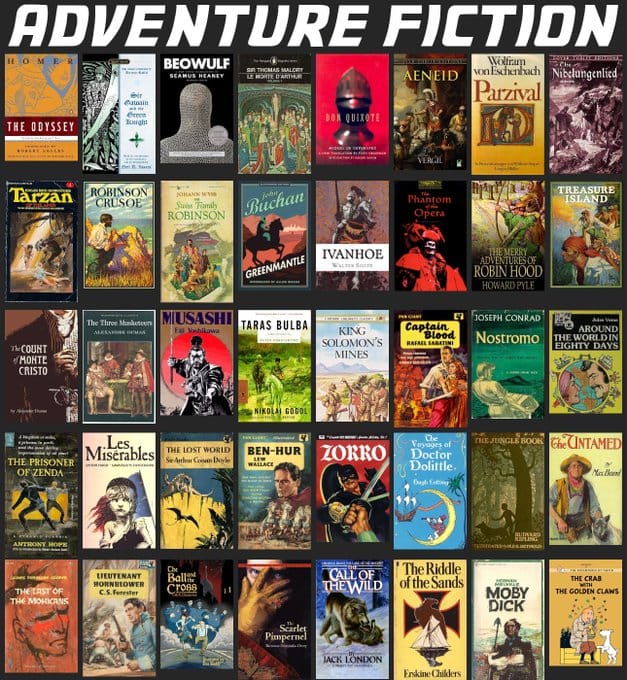
Comments ()